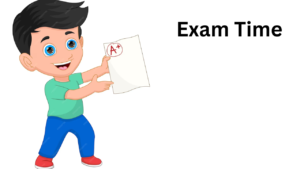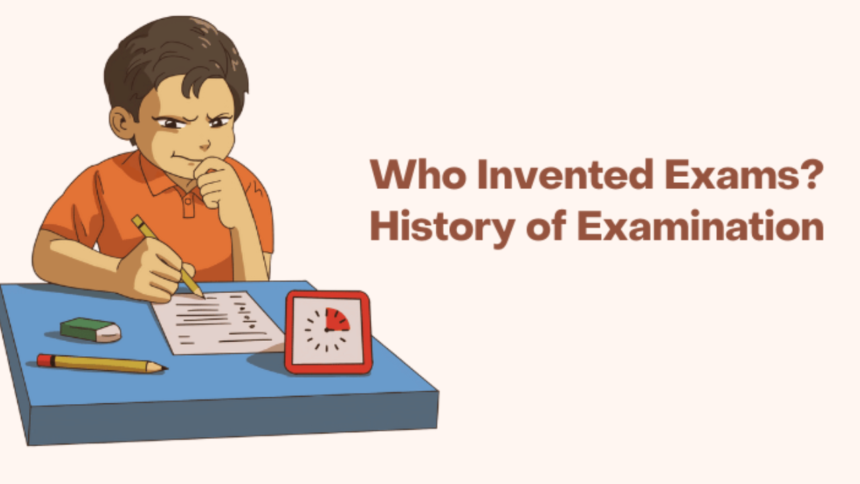Who Invented exams?
In this article, we’ve explored the fascinating history of exams – where they started, why they were invented, and how they’ve evolved over time. We’ve looked at their earliest forms, examined how exams are evaluated, and touched on various other aspects. Join us as we take a journey through the intriguing world of examinations!
In the late 1800s, Henry Fischel, a German American professor, etched his name into the annals of academia by introducing the groundbreaking concept of modern exams. His innovative approach transformed the way knowledge was assessed, leaving a lasting impact on education worldwide.

Who Invented exams?
The History of Exams in India
Ancient Roots: The origins of exams in India can be traced back to ancient times when Gurukuls, or traditional schools, were the primary centers of learning. Students underwent rigorous oral examinations, known as ‘Shastras,’ to demonstrate their proficiency in subjects such as philosophy, literature, and mathematics. These examinations were conducted by learned scholars and served as a means of assessing students’ knowledge and understanding.
Colonial Influence:
The arrival of the British East India Company marked a significant shift in India’s educational landscape. The British introduced the modern system of education, modeled after their own system, which emphasized standardized testing and formal examinations. The introduction of the Hunter Commission in 1882 laid the foundation for the establishment of the modern examination system in India, which included standardized board exams at various levels of education.
Post-Independence Reforms:
Following India’s independence in 1947, efforts were made to reform the examination system to make it more inclusive and accessible. The establishment of the University Grants Commission (UGC) in 1956 and the subsequent adoption of the 10+2+3 system of education standardized the examination process across the country. However, the examination system continued to face challenges such as exam-related stress, rote learning, and disparities in access to quality education.

Who Invented exams?
A Brief Journey Through the History of Exams
Introduction:
Exams are a fundamental part of education systems worldwide, serving as a measure of knowledge, skills, and understanding. However, the concept of exams didn’t just materialize overnight. Let’s take a fascinating journey through the history of exams, exploring their origins, evolution, and impact on society.
Ancient Beginnings:
The roots of exams can be traced back to ancient civilizations such as China, where standardized tests were used to select government officials based on merit. During the Sui Dynasty (581–618 AD), the imperial examination system emerged, marking one of the earliest instances of formalized testing. These exams aimed to ensure fairness and competence in governance, setting a precedent for future testing methods.
Medieval Europe:
In medieval Europe, exams took on different forms, often administered by religious institutions or guilds to assess proficiency in various trades and skills. For instance, apprenticeships required candidates to undergo rigorous examinations to demonstrate their craft knowledge before earning recognition as skilled workers.
Rise of Modern Education:
The Renaissance period witnessed a resurgence of interest in education and learning, leading to the establishment of universities across Europe. With the rise of formal education institutions came the need for standardized assessment methods. Exams became more structured and systematic, with written examinations becoming commonplace for evaluating students’ knowledge.
Industrial Revolution and Standardized Testing:
The Industrial Revolution brought about significant changes in society, including the rise of mass education. Standardized testing gained prominence as a means of assessing large groups of students efficiently. In the United States, the introduction of standardized tests such as the SAT (Scholastic Aptitude Test) and ACT (American College Testing) became crucial for college admissions, shaping the future of education assessment.
Evolution of Exam Formats:
Over time, exam formats have evolved to accommodate different subjects, skills, and learning styles. From traditional pen-and-paper tests to computer-based assessments, technology has played a significant role in reshaping the exam landscape. Additionally, alternative forms of assessment, such as project-based learning and performance tasks, have gained traction as educators seek to measure students’ holistic understanding and skills mastery.
Click Here-https://topbulletinnews.com/can-we-apply-vitamin-e-capsule-directly-on-face/
Types of Exams in India:
In India, the education system encompasses a diverse range of exams catering to various academic levels, fields of study, and career paths. Here are some of the key types of exams commonly encountered in the Indian context:
- Board Exams: Board exams are standardized tests conducted by state or central education boards, such as the Central Board of Secondary Education (CBSE) or various State Boards of Education. These exams typically assess students’ knowledge and skills at the secondary (Class 10) and higher secondary (Class 12) levels. Board exams play a crucial role in determining students’ academic performance and eligibility for further education.
- Entrance Exams: Entrance exams are competitive assessments conducted for admission to various undergraduate and postgraduate courses in colleges, universities, and professional institutions across India. These exams evaluate candidates’ aptitude, subject knowledge, and skills required for specific fields of study or professions. Examples include the Joint Entrance Examination (JEE) for engineering, the National Eligibility cum Entrance Test (NEET) for medical courses, and the Common Admission Test (CAT) for management programs.
- Competitive Exams: Competitive exams are nationwide assessments conducted to select candidates for employment or recruitment to government and public sector organizations, as well as prestigious scholarships and fellowships. These exams assess candidates’ academic knowledge, reasoning abilities, and general awareness. Some notable competitive exams in India include the Union Public Service Commission (UPSC) Civil Services Examination, Staff Selection Commission (SSC) Combined Graduate Level Examination, and the Graduate Aptitude Test in Engineering (GATE).
- University Exams: University exams are conducted by colleges and universities to assess students’ academic progress and award degrees or diplomas upon completion of their courses. These exams cover a wide range of subjects and disciplines, including arts, science, commerce, engineering, medicine, and law. University exams may include both theory-based assessments and practical examinations, depending on the nature of the course.
- Professional Certification Exams: Professional certification exams are assessments conducted by professional bodies or associations to certify individuals’ competence and proficiency in specific fields or industries. These exams validate candidates’ knowledge, skills, and adherence to professional standards and ethics. Examples include the Chartered Accountant (CA) exams conducted by the Institute of Chartered Accountants of India (ICAI) and the Certified Public Accountant (CPA) exam conducted by the American Institute of CPAs (AICPA).

Advantages of Exams:
Exams, despite often being viewed with mixed emotions, play a pivotal role in education and personal development. Here are some of the key advantages associated with exams:
- Assessment of Knowledge and Skills: Exams provide a structured and systematic way to assess students’ understanding of course material, subject knowledge, critical thinking abilities, and problem-solving skills. By evaluating students’ performance through exams, educators can gauge their progress and identify areas for improvement.
- Accountability and Motivation: Exams serve as a measure of accountability, encouraging students to stay focused and motivated in their studies. The prospect of exams incentivizes students to engage actively in learning activities, set academic goals, and strive for academic excellence. Additionally, exams create a sense of achievement and satisfaction upon successful completion, boosting students’ self-esteem and confidence.
- Feedback and Learning Outcomes: Exams offer valuable feedback to both students and educators, highlighting strengths and weaknesses in students’ understanding of the subject matter. Through exam results, students can identify areas where they need to concentrate their efforts for further improvement. Similarly, educators can use exam data to assess teaching effectiveness, refine instructional strategies, and tailor learning experiences to meet students’ needs.
- Standardized Assessment: Exams provide a standardized and impartial method of evaluation, ensuring fairness and consistency in assessing students’ performance across different classrooms, schools, or regions. Standardized exams help establish uniform academic standards, facilitate comparisons between students, and provide valuable insights into educational trends and outcomes.
- Preparation for Real-world Challenges: Exams simulate real-world situations where individuals are required to apply their knowledge and skills to solve problems, make decisions, and demonstrate competence. By preparing for exams, students develop essential life skills such as time management, organization, stress management, and resilience, which are invaluable for success in future endeavors.
-
Gateways to Opportunities: Exams serve as gateways to various academic, career, and professional opportunities, including admission to prestigious colleges and universities, eligibility for scholarships and fellowships, and employment in competitive industries or government sectors. Achieving success in exams opens doors to a wide range of possibilities and enhances individuals’ prospects for personal and professional growth.
Error: Contact form not found.









